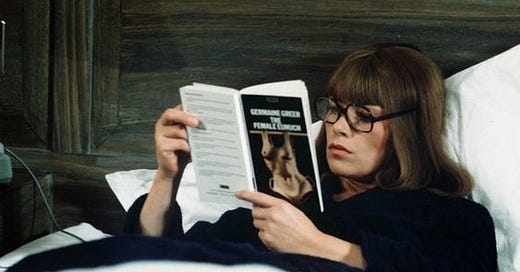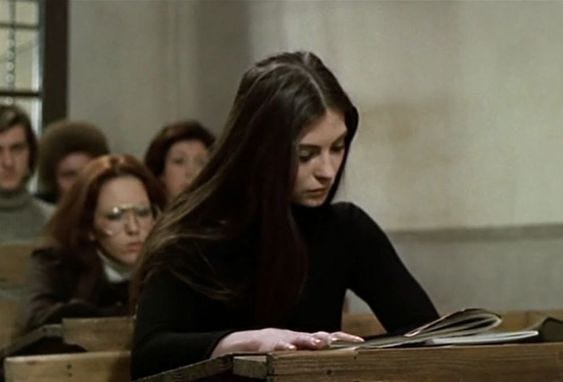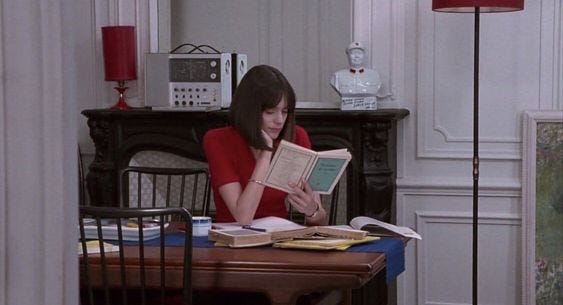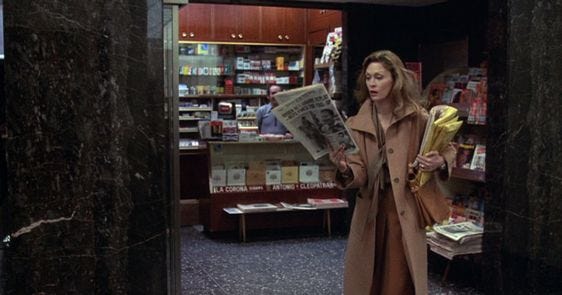unraveling the paradox: the appetite for knowledge juxtaposed by college reluctance
Hello.
In today’s newsletter, I’m discussing a topic that has been top of mind over the past several weeks. I’m talking about academic ambitions and aspirations juxtaposed by the dramatic decrease in young people opting out of college and higher education. With the rising trend of articletok and other data I’ve been gathering on the internet recently, I wanted to have the discussion with you here in further detail.
In recent years, the landscape of higher education and the pursuit of knowledge has undergone significant transformations, marked by contrasting trends that reveal a complex picture of young people's attitudes towards learning. On one hand, there is a noticeable decline in college enrollment, driven by factors such as the prohibitive costs of higher education, skepticism about the value of a traditional degree, and the rise of alternative career paths. On the other hand, young individuals, particularly women, exhibit a voracious appetite for knowledge and learning. This is especially evidenced by the popularity of BookTok, Dark Academia aesthetic, and other cultural trends. These phenomena tend to highlight a shift towards self-directed learning and intellectual engagement outside the conventional academic framework, pointing to a nuanced landscape where the desire for education persists, albeit in evolving forms and spaces.
The increase in young women's engagement with knowledge and learning in the media presents an interesting juxtaposition to the broader trends of declining college enrollment among young people.
This contrast can be explained through several lenses:
Digital Communities and Self-Directed Learning: Platforms like TikTok and Podcasts like The Stanza, Lex Fridman, Andrew Huberman, This Jungian Life, etc have created vibrant communities centered around books, learning, and intellectual discussion. These platforms empower young women to explore their interests in stem, literature, philosophy, and various academic subjects outside the traditional educational system. This indicates a strong desire for knowledge and self-improvement that isn't necessarily tied to formal education.
Aesthetics and Identity: The dark academia trend, which romanticizes classical education and the pursuit of knowledge with a Gothic, scholarly aesthetic, resonates with many young people, especially women, as a form of self-expression and identity. This trend promotes the allure of intellectualism and learning, often inspired by literature and history, suggesting that the craving for knowledge isn't diminishing but rather finding new outlets outside the conventional academic path.
Access to Resources: The internet has democratized access to information, allowing individuals to pursue knowledge on their terms. Online courses, open educational resources, and digital communities offer learning opportunities that are more accessible and often free, catering to those who seek education but may be deterred by the high costs and rigid structures of traditional college education.
Empowerment and Representation: There's a growing emphasis on empowering young women and providing them with role models in various fields, leading to a greater emphasis on education and learning. Social media and online platforms have played a significant role in highlighting successful women across different domains, encouraging young women to pursue knowledge and personal growth.
Balancing Formal Education and Personal Interests: While some young people, including women, may be opting out of traditional college paths, this doesn't necessarily mean they're rejecting learning altogether. Instead, they might be balancing formal education with personal interests, finding ways to integrate their love for literature, philosophy, and other subjects into their lives outside the classroom.
Perhaps Booktok planted the seed to spark this thirst for knowledge several years ago?
Books like The Secret History deeply inspired and romanticized the Dark Academia subculture and aesthetic, painting a beautiful portrait about the power of being educated.
Meanwhile, university attendance has decreased over the past several years. In the past decade, total college enrollment dropped by about 1.95 million students, or by approximately 10%. This decline in undergraduate college enrollment has accelerated since the pandemic began, resulting in a loss of nearly 1.4 million students, or almost 9% of total enrollment, between spring 2019 and spring 2023. There are several factors contribute to why many young people are opting out of college, despite the increase in college applications:
High Cost of Education: The rising cost of college tuition and associated expenses is a significant deterrent. According to the College Board, the average annual cost (tuition and fees) for a four-year public institution for in-state students was $10,740 for the 2021-2022 academic year, with out-of-state students and private college students facing even higher costs. This has led to a substantial increase in student loan debt, which stood at over $1.7 trillion in the U.S. by 2021, according to the Federal Reserve.
Questioning the Value of a Degree: There's growing skepticism about the return on investment of a college degree, especially in fields where the pay may not align with the costs incurred from education. The perception that a degree may not guarantee a good job or a pathway to a successful career has made some young people reconsider the traditional college route.
Alternative Education and Career Paths: There's an increasing awareness and acceptance of alternative education and career paths, such as trade schools, apprenticeships, and coding boot camps, which can lead to well-paying jobs without the need for a four-year degree. The rise of the gig economy and entrepreneurial opportunities has also made it possible for individuals to pursue successful careers without a traditional college education.
Impact of the COVID-19 Pandemic: The COVID-19 pandemic has had a profound impact on higher education, with the shift to online learning and the uncertainty about the future leading some students to defer or forego college. The pandemic has also caused economic strain for many families, making it harder to justify or afford the expense of college.
Workforce Trends: Some sectors, especially in technology and trades, often prioritize skills and experience over formal education, leading some young people to enter the workforce directly or pursue specific vocational training instead of a traditional college degree.
Mental Health and Well-being: The pressure and stress associated with college education, along with concerns about mental health and well-being, have also been factors for some young people deciding against college.
While these factors contribute to the decline in college enrollment, it's important to note that the landscape is complex and varies widely among different demographics and regions. The increasing number of applications suggests that while fewer students may be enrolling, those who do apply are applying to more colleges, possibly to increase their chances of acceptance in a competitive environment.
Women seeking to establish credibility in the absence of a college degree can leverage a blend of professional certifications, online courses, practical experience, and active participation in relevant communities to demonstrate their expertise and commitment to continuous learning. Engaging in projects, contributing to industry discussions through publications, and building a strong professional network are all strategies that can showcase one's knowledge and skills. However, the perception of credibility varies across industries and individuals; while some sectors and employers highly value practical experience and self-directed learning, others may still prioritize traditional academic credentials. The key is to tailor one's approach to the norms and expectations of the chosen field, continuously seeking opportunities to learn, contribute, and demonstrate expertise in tangible ways.
Contrastingly, attending college, within the context of evolving job markets and diverse paths to success, remains a strategic choice for those looking to deepen expertise, foster critical thinking, and expand networks. It is a platform for not only academic growth but personal and professional development, offering a blend of theoretical knowledge and practical experiences. This decision, made with an understanding of both the challenges and potential returns of higher education, can pave the way for meaningful contributions to society and fulfilling careers.
So where does this leave us?
The journey toward knowledge and professional respect is becoming increasingly personalized, reflecting a diverse array of values, experiences, and goals. As we navigate this changing terrain, the essence of education—growth, exploration, and the pursuit of understanding—remains constant, even as the paths we take diverge from the well-trodden roads of the past. This evolution invites a reimagining of what it means to be educated and how we validate and recognize learning and expertise. In this context, the pursuit of knowledge becomes not just an individual endeavor but a collective challenge to redefine success and credibility in a way that honors the richness of human capacity and curiosity.
For further exploration into these topics, here are several related articles to read at your leisure:
The Kids Don’t Want to Go to College Anymore, and Why Would They?
In an era where the intrinsic value of a college education is under scrutiny, rising costs and diminishing returns cast long shadows over the traditional pathway to the American Dream, challenging the once-unquestioned belief in higher education as the great equalizer and prompting a reevaluation of its role in fostering opportunity and social mobility.
Wired
How TikTok Became A Best-Seller Machine
These articles offer a comprehensive look at the changing dynamics of education and career success, emphasizing the value of alternative education pathways and the diverse means through which individuals can achieve success and credibility in their professional lives. They provide valuable insights for those rethinking the traditional college path and looking for viable alternatives that align with their career goals and personal circumstances.
The New York Times
BookTok Is Good Actually: On The Undersung Joys Of A Vast And Multifarious Platform
The narrative delves into the vibrant and multifaceted BookTok community, challenging stereotypes of superficiality with firsthand experiences of its depth and diversity. It portrays BookTok as a dynamic platform where passionate readers go beyond mainstream bestsellers, fostering a culture of diverse literary exploration and enthusiastic discussion. The community's impact is seen in its power to drive book sales and create viral sensations, reshaping traditional publishing dynamics and celebrating a wide array of literary tastes and genres.
Literary Hub
Dark Academia is a trend that merges a deep appreciation for classical education with a gothic aesthetic inspired by prestigious institutions like Oxbridge and the Ivy League. It's a form of escapism that romanticizes the pursuit of knowledge, often depicted through elements like candlelit study sessions, classical music, and vintage fashion. This aesthetic has found a particularly strong following among Gen Z on platforms like TikTok, where it's celebrated for its emphasis on intellectualism and the arts, albeit with a dark twist that often explores themes of morbidity and existentialism.
Big Think
The Smart Money Is Still On College, But Hedge Your Bet By Choosing Wisely
The article emphasizes the growing importance of higher education due to the changing job market, where an increasing number of jobs will require post-secondary education by 2031. While the value of a college degree in lifetime earnings is significant, the decision to pursue higher education should be made with careful consideration of personal interests and the evolving landscape of job opportunities, particularly in fast-growing sectors like healthcare. It also cautions against the rising skepticism towards the necessity of a college degree, highlighting the long-term risks of forgoing higher education.
Forbes
If you’re looking to feed your curiosities, here are some podcasts to make you smarter:
This Jungian Life Podcast: A dive into the complexities of the human psyche through the lens of Jungian psychology, dreams, and symbolism.
Hidden Brain Podcast: Unveils the unconscious patterns that drive human behavior, relationships, and decision-making.
The Stanza Podcast: An investor’s perspective on hospitality and fashion.
Sean Carroll’s Mindscape Podcast: A journey into the most intriguing aspects of science, society, philosophy, and the arts with leading experts.
Huberman Lab Podcast: Explores neuroscience and biology-based approaches to optimize health, brain function, and personal productivity.
Lex Fridman Podcast: Conversations exploring deep questions in science, technology, and philosophy with a wide array of guests from various fields. (problematic in some regards, but there are some compelling and interesting interviews worth listening to)
High Brow Podcast: A show for chic girls and self identified intellectuals.
Ezra Klein Show Podcast: In-depth discussions with thought leaders and experts on pressing political, economic, and societal issues. (problematic in some regards, but there are some compelling and interesting interviews worth listening to)
That’s all for today. Please share your thoughts below.
See you tomorrow.
Bye.







